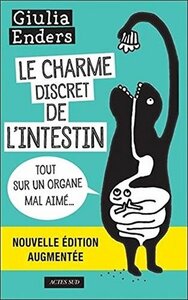You need to sign in or sign up before continuing.
Take a photo of a barcode or cover
funny
informative
lighthearted
medium-paced
Sehr aufschlussreich und unterhaltsam! Mir hat nur ein bisschen der rote Faden gefehlt, aber hat trotzdem großen Spaß gemacht.
informative
funny
informative
fast-paced
Fascinating journey through our digestive system, it's certainly made me more determined to eat better.
funny
informative
medium-paced
Would've appreciated some more scientific detail, but I like how it stayed accessible to those with no background in biology. My favorite part was the description of various research studies, which were super cool to learn about.
The writing style of this book did my nut in! I’m all for making non-fiction accessible and it certainly doesn’t have to be boring or jargon-y, but there were just soooo many childish similes. I think the author tried to be funny/relatable but to me it felt incredibly infantilising throughout.
The author also jokes about self-harm, comparing a self-harmer’s life to „bland soup that lacks hot sauce (=pain)“. Like WTF?
And if that weren’t enough, there’s also casual racism in the salmonella chapter. Just spitballing here, but I reckon the biggest feeding ground for salmonella would probably be the appalling hygiene in Western poultry processing due to profit maximisation. Yet the example she chose to highlight is the stereotype of lacking hygiene in Africa.
She further included plain wrong info claiming „all the babies born in Antarctica died shortly after birth or on the way back to South America, because Antarctica is germ-free and they hadn’t been exposed to the bacteria they needed to survive“. This sounded sus to me and I vaguely remembered reading about those babies before. Turns out some of them live happy lives and others simply haven’t got much information on the internet but there is also no evidence of their infant death. On the contrary, Antarctica claims a 0% infant mortality rate so they certainly didn’t die during birth or shortly after. Giulia Enders also provides no source for this in her book, so it just seems like a made up „fact“ to make a point.
This leads me to another annoyance with the book. There is a list of references but they are sorted alphabetically by book section (not by the smaller chapters!) which is not helpful at all. Sources are not linked to the text they refer to, so if you want to read up on a topic / research study you have to first go through the list and guess which source it comes from. Footnotes (ideally linked in the ebook) would have made things easier and more user friendly.
Now, I did find some of the book interesting, especially the mind-gut connection. But overall the book didn’t add much value for me. Especially the last few chapters seemed a bit all over the place as well („here‘s some research that‘s still very early doors and possibly unreliable and also here‘s a Sauerkraut recipe?“).
All in all, I can’t recommend this book and if I’m honest I should have DNFed it. I only continued reading because I wanted to know about the topic and I knew that if I started another book about it, there’d be a lot of overlap and I don’t have the patience for that.
Moderate: Self harm
informative
informative
reflective
medium-paced




